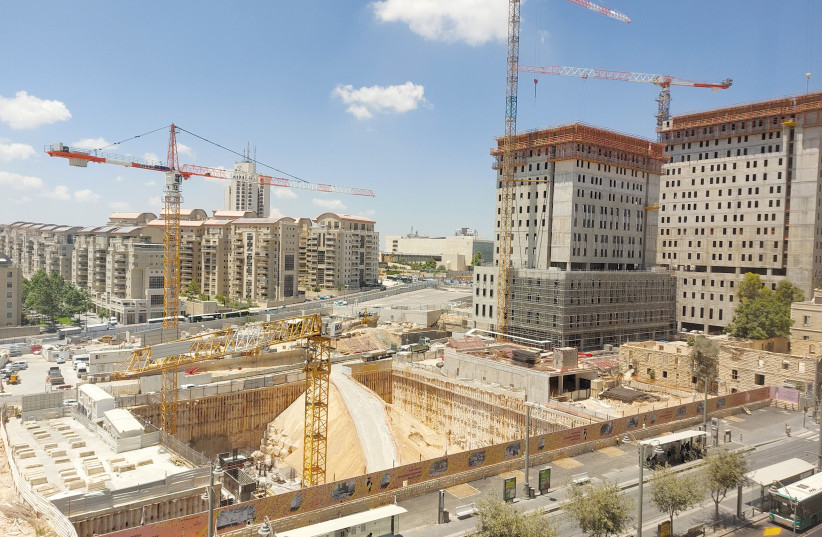If anyone here thinks that the most closely guarded secrets of the State of Israel are related to Iran and the bomb, then you’ve got it all wrong. It turns out that Israel’s biggest secret is not what you hear or read in the news but rather the cost of upgrading works on the streets and sidewalks of the capital.
In fact, it is such a well-kept secret that almost a week of polite dialogue between this journalist and the municipality spokesman administration hasn’t been enough to reveal it.
As part of the municipal work plan for 2022, an important section appeared: the renovation and upgrading of the sidewalks in several neighborhoods in the city (with the intention that each year different neighborhoods will be treated), as well as the stratification and renovation of the main streets in those neighborhoods.
So far, nothing major that should have interested us beyond a degree of certain discomfort during the road work for residents of the designated neighborhoods.
But plans and reality are two different things. If we take as an example what happened so far this year in a specific neighborhood, then add to that all the familiar jokes about lack of coordination, a big mess and endless harassment for the residents – not to mention the horrendous waste of public money – they all coalesced in what happened in the Talpiot-Arnona-Baka upgrading project.

A horrendous waste of public money in Jerusalem construction
Out of a wise desire to involve several contractors in the projects, the work was ordered from different companies for the Baka neighborhood (Bethlehem Road) and for Talpiot-Arnona (mainly Ein Gedi Street and its surroundings).
The inconvenience was expected. The municipality behaved quite reasonably and shared all the information required with the residents through the community administrations. They were informed in real time (flyers, street signs and so forth) when the treated roads would be closed, when there would be night work, where to park in an alternative parking lot during the work process and everything else that is involved.
On Bethlehem Road, the work progressed at a reasonable pace. When it was completed, the neighborhood residents were treated to a modest ceremony attended by the mayor himself, with microphones, national flags and light refreshments to herald the end of the renovations and to wish good luck to the residents who were now blessed with paved sidewalks and a well-paved road.
But in Talpiot, on Ein Gedi Street and along the sidewalks, it was a completely different story. The work progressed like molasses. The tiles chosen to pave the sidewalks were of the worst quality, threatening pedestrians to trip and fall. The workers employed were either unskilled or did not receive the proper training, and the result was extremely bad and totally unacceptable.
Renovation in Jerusalem's Talpiot was extremely bad, totally unacceptable
SO MUCH for the facts – but what is the hidden secret and who is hiding information from us? First of all, who did the work? Such a simple piece of information: Which contractor did the unsuccessful work and which one redid it? And the sidewalks and the street have been inaccessible, as if they were the hidden files of a nuclear plant.
One of the claims that spread like wildfire and raised the ire of the residents of Ein Gedi Street was that because the residents complained so much about the inconvenience, the contractor was in a hurry to complete the job and, as a result, the work was of poor quality.
There is, of course, the possibility that at Safra Square, some think that the residents of Arnona-Talpiot believe in fairy tales. Anything is possible. But that’s not how things are. The contractor simply did a sloppy and inappropriate job, regardless of the time it took. And, by the way, it took a long time.
In the end, the community manager, the residents’ organizations and the municipality realized that it was impossible to proceed, and it was decided to redo all the work – both the sidewalks along Ein Gedi Street and the road itself. And again, it took quite a bit of time. Once again, they dug along and closed the sidewalks and disrupted the residents’ daily life.
But here is finally a positive point: The work is being finished this week, and everything looks really good this time.
However, the most intriguing questions still remain unanswered: How much did all this work cost? How much did the first unsuccessful job cost? How much did the repairs cost? Who did the repair work – was it the same contractor or another contractor?
How much does this bad construction and repair work cost, and who is paying?
And, most importantly: Who pays? The municipality (that is, from our city taxes) and/or the community administration (again, with our money, since the residents pay for its services)? And, of course, the most basic question: How much will it cost, no matter who pays?
Who knows?
At press time, a spokesman for the municipality said that the cost of the work in Ein Gedi Street was NIS 11.5 million, but did not specify if that amount included the repairs that were made. ❖
